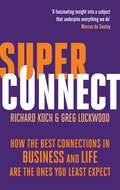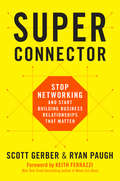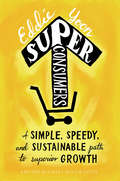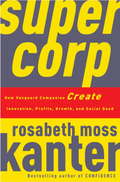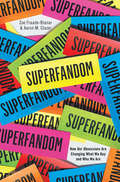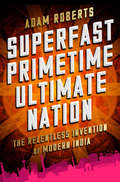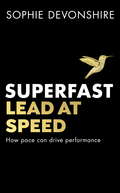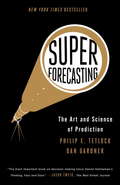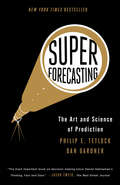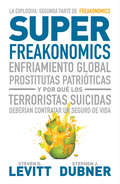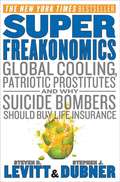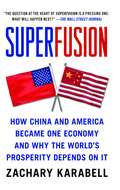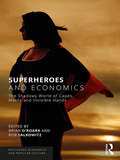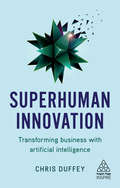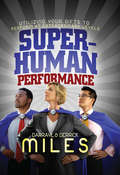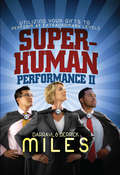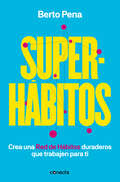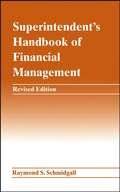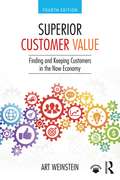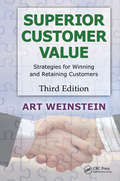- Table View
- List View
Superconnect: How the Best Connections in Business and Life Are the Ones You Least Expect
by Richard Koch Greg LockwoodNetworks rule the world. Take any organization: a corner shop, a new venture, a gang of drug traffickers, the United Nations, Google, the place you work. They are all networks, with their own rules and values and ways of communicating. Everybody belongs to networks and they make a huge difference to our lives - to our happiness and to our opportunities. SUPERCONNECT looks at how the successful and fortunate few behave - and shows that if you want to be one of them, you have to play by the network rules.Acquaintances, friends of friends, distant neighbours, random encounters - all can put us in touch with new, different worlds that bring big breaks or surprising sources of happiness. We are becoming more and more connected - via the web, mobile phone technology and global media. How does this affect us? And how can we make the most of these connections?
Superconnector: Stop Networking And Start Building Business Relationships That Matter
by Scott Gerber Ryan PaughAbandon the networking-for-networking's-sake mentality in favor of a more powerful and effective approach to creating and enhancing connections.STOP NETWORKING. Seriously, stop doing it. Now. It is time to ditch the old networking-for networking's-sake mentality in favor of a more powerful and effective approach to creating and enhancing connections. In Superconnector, Scott Gerber and Ryan Paugh reveal a new category of professionals born out of the social media era: highly valuable community-builders who make things happen through their keen understanding and utilization of social capital. Superconnectors understand the power of relationship-building, problem-solve by connecting the dots at high levels, and purposefully cause different worlds and communities to interact with the intention of creating mutual value.How can you become a Superconnector? Gerber and Paugh share instructive anecdotes from a who's who roster of high achievers, revealing how to systematically manage a professional community and maximize its value. Of utmost importance is practicing Habitual Generosity, acting on the knowledge that your greatest returns come when you least expect them, and that by putting others' needs first the good karma will flow back to you tenfold. Gerber and Paugh also explore winning strategies such as The Art of Selectivity, a well-honed ability to define which relationships matter most for you and decide how you will maintain them over time. Full of helpful advice on how to communicate with anyone about anything, Google-proof your reputation, and much more, Superconnector is a must-read for those seeking personal and business success.
Superconsumers: A Simple, Speedy, and Sustainable Path to Superior Growth
by Eddie YoonPork dorks. Craftsters. American Girl fans. Despite their different tastes, these eclectic diehards have a lot in common: they're obsessed about a specific brand, product, or category. They pursue their passions with fervor, and they're extremely knowledgeable about the things they love. They aren't average consumers-they're superconsumers.Although small in number, superconsumers can have an outsized impact on a company's bottom line. Representing 10% of total consumers, they can drive between 30% to 70% of sales, and they're usually willing to spend considerably more than the average consumer. And because they're so engaged and passionate, they can offer invaluable advice to managers looking to improve their products, change their business models, energize their cultures, and attract new customers.In Superconsumers, growth strategy expert Eddie Yoon lays out a simple but extremely effective framework that has helped companies of all types and sizes achieve more sustainable growth: he'll show you how to find, listen to, and engage with your most passionate and profitable consumers, and then tailor your decisions to meet their wants and needs. Along the way, he'll let you into the minds and homes of superconsumers of all kinds, revealing what makes them tick and why they're willing to spend so much more than other consumers.Rich with data and case studies of companies that have implemented superconsumer strategies with great success, Superconsumers is a fun, practical, and inspiring guide for anyone interested in making their best customers even better.
Supercorp: How Vanguard Companies Create Innovation, Profits, Growth, And Social Good
by Rosabeth Moss KanterRosabeth Moss Kanter on the answer to the global crisis of business and American-style capitalism Out of the ashes of conventional business models arises a set of companies using their power not only for profits and sustainable growth but also social good. If you think business corporations are doomed to be lumbering, bloated, and corrupt, think again. Based on an extraordinary three-year investigation, interviewing more than 350 key people at major companies around the world, Rosabeth Moss Kanter provides encouraging and astounding evidence that this assumption is completely outdated. The businesses that are agile, keeping ahead of the curve in terms of market changes and customer needs, are the businesses that are also progressive, socially responsible human communities. Take IBM. When the tsunami and earthquake struck Asia, IBM didn't just cut a check for relief funds and call it a day. The company used its technological expertise and skilled people to create what government and relief agencies could not: information systems to effectively track relief supplies and reunite families. While IBM did this with no commercial motive, its employees desire to serve people suffering during these crises stimulated innovations that later benefited the company. Or Proctor & Gamble. Despite a decade-long commitment to research and development of a water purification product, commercial prospects were unpromising. But because it was so consistent with P&G's statement of purpose, people within the company persevered. And when the tsunami struck, it was then able to deliver roughly a billion glasses of drinking water for the victims, earning plaudits from aid partners, the media, governments, and crucially, P&G employees. SuperCorp captures the zeitgeist of the emerging twenty-first-century business. For example: The strong potential synergy between financial performance and attention to community and social needs The unique competitive advantage from embracing the values and expectations of a new generation of professionals The growth opportunities that result from stressing values and supressing executive egos when seeking partners and integrating acquisitions SuperCorpis a remarkable look at the business of the future and the management skills required to get there. IBM, Banco Real, P&G, Cemex, Omron, and other companies reported on now move with the rapidity and creativity of much smaller enterprises. These companies are not perfect, but when people are empowered and values drive decisions, everything can come together in magical Rubik's Cube moments of deep satisfaction. Kanter's compelling and inspiring stories show that people are more inclined to be creative when their company values innovation that helps the world.
Superfandom: How Our Obsessions are Changing What We Buy and Who We Are
by Aaron M. Glazer Zoe Fraade-BlanarAn in-depth look at the influence of fans—society’s alpha consumers—on our lives and culture. As fandom sheds its longtime stigmas of geekiness and hysteria, fans are demanding more from the celebrities and brands they love. Digital tools have given organizations—from traditional businesses to tech startups—direct, real-time access to their most devoted consumers, and it’s easy to forget that this access flows both ways. This is the new “fandom-based economy”: a convergence of brand owner and brand consumer. Fan pressures hold more clout than ever before as audiences demand a say in shaping the future of the things they love. In Superfandom, Zoe Fraade-Blanar and Aaron M. Glazer explain this new era of symbiosis. For producers, it can mean a golden opportunity: brands such as Polaroid and Surge, preserved by the passion of a handful of nostalgic fans, can now count on an articulate, creative, and, above all, loyal audience. Yet, the new economy has its own risks—it’s also easier than ever for companies to lose their audience’s trust, as Valve did when it tried to introduce a paid mod system for its Skyrim video game. Examining key cases that span a wide range of consumer markets, Fraade-Blanar and Glazer explain why some kinds of engagement with fans succeed and some backfire. Throughout, the authors probe fandom’s history, sociology, and psychology. From the nineteenth-century American Alice Drake, who bribed her way into the houses of her favorite European composers, to Hatsune Miku, the Japanese virtual celebrity whose songs are composed entirely by fans, the dynamics of fandom—the activities we perform to show we belong to a group of people with common interests—may be as old as culture itself. For groupies of financier Warren Buffet and enthusiasts of Cards Against Humanity alike, the consumer relationship has been transformed. Superfandom is an essential guide for those who care about, contribute to, and live in our rapidly expanding fan-driven economy.
Superfast Primetime Ultimate Nation: The Relentless Invention of Modern India
by Adam RobertsWho can foretell India's future? Mr. Joshi is a fortune teller in a slum in south Delhi who uses a soothsaying green parrot to make predictions. When Adam Roberts visited him in 2012, Joshi's parrot declared that India was destined to become the most powerful nation under Prime Minister Narendra Modi. The parrot also foretold that India would win the soccer World Cup.Parrots may not be the preeminent political authority, but many Indians were just as confident. So Adam Roberts spent five years traveling the length and breadth of the country from Kerala to the Himalayas, Bengal to Gujarat. As he encountered the power brokers, gate keepers, and elaborate social dynamics of the world's largest democracy, he asked if--and how--India can become a truly great economic power, more influential abroad and stable at home. He met prime ministers, multimillionaires, traveling salesmen, pilgrims, eco-warriors, farmers, and tech innovators, each wrestling with the trials posed by the world's most conspicuously nearly great power. He experienced an immense country that, despite daunting challenges, is entering the most optimistic period in its modern history.Through vivid storytelling and insight, Superfast Primetime Ultimate Nation examines the problems and promises of fast-growing India to reveal how it might reach its full potential and become, as Mr. Joshi's parrot predicted, a truly powerful nation.
Superfast: Lead at speed
by Sophie DevonshireIn today's fast-paced world, leaders need to move at speed. The rate of innovation and change in organisations and the challenges of impatient investors or shareholders mean leadership decisions must be quick, smart and deliver real impact. Superfast provides easily-digestible inspiration and ideas about how to accelerate performance in an agile and thoughtful way. It includes interviews with leaders of big global corporations, fast-moving unicorn start-ups and even the Head of a Counter Terrorism Unit; all of them facing the challenges of a rapidly changing, uncertain situation. This book focuses on practical solutions to leadership questions and is a shortcut to personal and professional success for ambitious leaders.
Superfast: Lead at speed - Shortlisted for Best Leadership Book at the Business Book Awards
by Sophie DevonshireIn today's fast-paced world, leaders need to move at speed. The rate of innovation and change in organisations and the challenges of impatient investors or shareholders mean leadership decisions must be quick, smart and deliver real impact.Superfast provides cutting edge inspiration and a host of exciting ideas about how to accelerate performance in an agile and thoughtful way, shedding new light on leading in a world which is fluid and uncertain. You'll learn the practical solutions to leadership questions which the most savvy global leaders employ, and map your own shortcut to personal and professional success.Leadership is not just about moving fast, however. Superfast will show you how to use your time in the smartest, most efficient way possible - slowing down when necessary to get decisions right and accelerating elsewhere to unlock growth.Stop waiting around. Superfast will give you the tools to lead well and make change happen.
Superforecasting
by Philip E. Tetlock Dan GardnerFrom one of the world's most highly regarded social scientists comes a seminal book on forecasting that shows, for the first time, how we can all get better at making predictions. In Superforecasting, Tetlock and coauthor Dan Gardner offer a masterwork on prediction, drawing on decades of research and the results of a massive, government-funded forecasting tournament. The Good Judgment Project involves tens of thousands of ordinary people--including a Brooklyn filmmaker, a retired pipe installer, and a former ballroom dancer--who set out to forecast global events. Some of the volunteers have turned out to be astonishingly good. They've beaten other benchmarks, competitors, and prediction markets. They've even beaten the collective judgment of intelligence analysts with access to classified information. They are "superforecasters." The authors show us how we can learn from this elite group. Weaving together stories of forecasting successes (the raid on Osama bin Laden's compound) and failures (the Bay of Pigs) and interviews with a range of high-level decision makers, from David Petraeus to Robert Rubin, they show that good forecasting doesn't require powerful computers or arcane methods. It involves gathering evidence from a variety of sources, learning to think probabilistically, working in teams, keeping score, and being willing to admit error and change course. Superforecasting offers the first demonstrably effective way to improve our ability to predict the future--whether in business, finance, politics, international affairs, or daily life--and is destined to become a modern classic.
Superforecasting
by Philip E. Tetlock Dan GardnerFrom one of the world's most highly regarded social scientists, a transformative book on the habits of mind that lead to the best predictions Everyone would benefit from seeing further into the future, whether buying stocks, crafting policy, launching a new product, or simply planning the week's meals. Unfortunately, people tend to be terrible forecasters. As Wharton professor Philip Tetlock showed in a landmark 2005 study, even experts' predictions are only slightly better than chance. However, an important and underreported conclusion of that study was that some experts do have real foresight, and Tetlock has spent the past decade trying to figure out why. What makes some people so good? And can this talent be taught? In Superforecasting, Tetlock and coauthor Dan Gardner offer a masterwork on prediction, drawing on decades of research and the results of a massive, government-funded forecasting tournament. The Good Judgment Project involves tens of thousands of ordinary people--including a Brooklyn filmmaker, a retired pipe installer, and a former ballroom dancer--who set out to forecast global events. Some of the volunteers have turned out to be astonishingly good. They've beaten other benchmarks, competitors, and prediction markets. They've even beaten the collective judgment of intelligence analysts with access to classified information. They are "superforecasters." In this groundbreaking and accessible book, Tetlock and Gardner show us how we can learn from this elite group. Weaving together stories of forecasting successes (the raid on Osama bin Laden's compound) and failures (the Bay of Pigs) and interviews with a range of high-level decision makers, from David Petraeus to Robert Rubin, they show that good forecasting doesn't require powerful computers or arcane methods. It involves gathering evidence from a variety of sources, thinking probabilistically, working in teams, keeping score, and being willing to admit error and change course. Superforecasting offers the first demonstrably effective way to improve our ability to predict the future--whether in business, finance, politics, international affairs, or daily life--and is destined to become a modern classic.
Superforecasting
by Philip E. Tetlock Dan GardnerA New York Times Bestseller"The most important book on decision making since Daniel Kahneman's Thinking, Fast and Slow."--Jason Zweig, The Wall Street Journal Everyone would benefit from seeing further into the future, whether buying stocks, crafting policy, launching a new product, or simply planning the week's meals. Unfortunately, people tend to be terrible forecasters. As Wharton professor Philip Tetlock showed in a landmark 2005 study, even experts' predictions are only slightly better than chance. However, an important and underreported conclusion of that study was that some experts do have real foresight, and Tetlock has spent the past decade trying to figure out why. What makes some people so good? And can this talent be taught? In Superforecasting, Tetlock and coauthor Dan Gardner offer a masterwork on prediction, drawing on decades of research and the results of a massive, government-funded forecasting tournament. The Good Judgment Project involves tens of thousands of ordinary people--including a Brooklyn filmmaker, a retired pipe installer, and a former ballroom dancer--who set out to forecast global events. Some of the volunteers have turned out to be astonishingly good. They've beaten other benchmarks, competitors, and prediction markets. They've even beaten the collective judgment of intelligence analysts with access to classified information. They are "superforecasters." In this groundbreaking and accessible book, Tetlock and Gardner show us how we can learn from this elite group. Weaving together stories of forecasting successes (the raid on Osama bin Laden's compound) and failures (the Bay of Pigs) and interviews with a range of high-level decision makers, from David Petraeus to Robert Rubin, they show that good forecasting doesn't require powerful computers or arcane methods. It involves gathering evidence from a variety of sources, thinking probabilistically, working in teams, keeping score, and being willing to admit error and change course. Superforecasting offers the first demonstrably effective way to improve our ability to predict the future--whether in business, finance, politics, international affairs, or daily life--and is destined to become a modern classic.
Superforecasting
by Philip E. Tetlock Dan GardnerA New York Times Bestseller"The most important book on decision making since Daniel Kahneman's Thinking, Fast and Slow."--Jason Zweig, The Wall Street Journal Everyone would benefit from seeing further into the future, whether buying stocks, crafting policy, launching a new product, or simply planning the week's meals. Unfortunately, people tend to be terrible forecasters. As Wharton professor Philip Tetlock showed in a landmark 2005 study, even experts' predictions are only slightly better than chance. However, an important and underreported conclusion of that study was that some experts do have real foresight, and Tetlock has spent the past decade trying to figure out why. What makes some people so good? And can this talent be taught? In Superforecasting, Tetlock and coauthor Dan Gardner offer a masterwork on prediction, drawing on decades of research and the results of a massive, government-funded forecasting tournament. The Good Judgment Project involves tens of thousands of ordinary people--including a Brooklyn filmmaker, a retired pipe installer, and a former ballroom dancer--who set out to forecast global events. Some of the volunteers have turned out to be astonishingly good. They've beaten other benchmarks, competitors, and prediction markets. They've even beaten the collective judgment of intelligence analysts with access to classified information. They are "superforecasters." In this groundbreaking and accessible book, Tetlock and Gardner show us how we can learn from this elite group. Weaving together stories of forecasting successes (the raid on Osama bin Laden's compound) and failures (the Bay of Pigs) and interviews with a range of high-level decision makers, from David Petraeus to Robert Rubin, they show that good forecasting doesn't require powerful computers or arcane methods. It involves gathering evidence from a variety of sources, thinking probabilistically, working in teams, keeping score, and being willing to admit error and change course. Superforecasting offers the first demonstrably effective way to improve our ability to predict the future--whether in business, finance, politics, international affairs, or daily life--and is destined to become a modern classic.
Superforecasting: The Art and Science of Prediction
by Philip E. Tetlock Dan GardnerA New York Times BestsellerAn Economist Best Book of 2015"The most important book on decision making since Daniel Kahneman's Thinking, Fast and Slow."--Jason Zweig, The Wall Street Journal Everyone would benefit from seeing further into the future, whether buying stocks, crafting policy, launching a new product, or simply planning the week's meals. Unfortunately, people tend to be terrible forecasters. As Wharton professor Philip Tetlock showed in a landmark 2005 study, even experts' predictions are only slightly better than chance. However, an important and underreported conclusion of that study was that some experts do have real foresight, and Tetlock has spent the past decade trying to figure out why. What makes some people so good? And can this talent be taught? In Superforecasting, Tetlock and coauthor Dan Gardner offer a masterwork on prediction, drawing on decades of research and the results of a massive, government-funded forecasting tournament. The Good Judgment Project involves tens of thousands of ordinary people--including a Brooklyn filmmaker, a retired pipe installer, and a former ballroom dancer--who set out to forecast global events. Some of the volunteers have turned out to be astonishingly good. They've beaten other benchmarks, competitors, and prediction markets. They've even beaten the collective judgment of intelligence analysts with access to classified information. They are "superforecasters." In this groundbreaking and accessible book, Tetlock and Gardner show us how we can learn from this elite group. Weaving together stories of forecasting successes (the raid on Osama bin Laden's compound) and failures (the Bay of Pigs) and interviews with a range of high-level decision makers, from David Petraeus to Robert Rubin, they show that good forecasting doesn't require powerful computers or arcane methods. It involves gathering evidence from a variety of sources, thinking probabilistically, working in teams, keeping score, and being willing to admit error and change course. Superforecasting offers the first demonstrably effective way to improve our ability to predict the future--whether in business, finance, politics, international affairs, or daily life--and is destined to become a modern classic.From the Hardcover edition.
Superfreakonomics
by Stephen J. Dubner Steven D. LevittLa economía trata sobre la inflación, los tipos de interés y la bolsa. Superfreakonomics habla de prostitutas, traficantes de droga y luchadores de sumo fracasados. Han sido cuantro años buscando no solo las preguntas más difíciles, sino las más sorprendentes: ¿Es más peligroso conducir borracho o caminar borracho? ¿Por qué se receta la quimioterapia tan a menudo si es tan poco eficaz? ¿Puede un cambio de sexo elevar tu salario?Superfreakonomics desafía nuestra manera de pensar, y explora el lado oculto de las cosas con preguntas como:¿En qué se parece una prostituta al Papá Noel de unos grandes almacenes?¿Por qué los médicos se lavan tan poco las manos?¿Cuán útiles son los cinturones de seguridad?¿Cuál es la mejor manera de atrapar a un terrorista?¿Provocó la televisión un incremento del crimen?¿Qué tienen en común los huracanes, los ataques al corazón y las muertes en carretera?¿Para el ser humano es innato el altruismo o el egoísmo?¿Podemos salvar el planeta comiendo canguro?¿Qué genera más valor añadido, un proxeneta o un agente inmobiliario?Levitt y Dubner combinan una gran inteligencia con la capacidad para contar historias mejor que nadie, ya sea a la hora de buscar una solución al calentamiento global o explicar por qué el precio del sexo oral ha caído de manera tan radical. Al analizar cómo la gente responde a los incentivos, muestran el mundo tal cual es: bueno, malo, feo, y finalmente, superfreaky.Muchos han intentado imitar el éxito de Freakonomics, pero solo Superfreakonomics lo supera.
Superfreakonomics: Enfriamiento global, prostitutas patrióticas y por qué los terroristas suicidas deberían contratar un seguro de vida
by Stephen J. Dubner Steven D. LevittLa explosiva segunda parte de Freakonomics. La economía trata sobre la inflación, los tipos de interés y la bolsa. Superfreakonomics habla de prostitutas, traficantes de droga y luchadores de sumo fracasados. Han sido cuatro años buscando no solo las preguntas más difíciles, sino las más sorprendentes: ¿Es más peligroso conducir borracho o caminar borracho? ¿Por qué se receta la quimioterapia tan a menudo si es tan poco eficaz? ¿Puede un cambio de sexo elevar tu salario? Superfreakonomics desafía nuestra manera de pensar, y explora el lado oculto de las cosas con preguntas como: *¿En qué se parece una prostituta al Papá Noel de unos grandes almacenes? *¿Por qué los médicos se lavan tan poco las manos? *¿Cuán útiles son los cinturones de seguridad? *¿Cuál es la mejor manera de atrapar a un terrorista? *¿Provocó la televisión un incremento del crimen? *¿Qué tienen en común los huracanes, los ataques al corazón y las muertes en carretera? *¿Para el ser humano es innato el altruismo o el egoísmo? *¿Podemos salvar el planeta comiendo canguro? *¿Qué genera más valor añadido, un proxeneta o un agente inmobiliario? Levitt y Dubner combinan una gran inteligencia con la capacidad para contar historias mejor que nadie, ya sea a la hora de buscar una solución al calentamiento global o explicar por qué el precio del sexo oral ha caído de manera tan radical. Al analizar cómo la gente responde a los incentivos, muestran el mundo tal cual es: bueno, malo, feo, y finalmente, superfriki. Muchos han intentado imitar el éxito de Freakonomics, pero solo Superfreakonomics lo supera. Reseña:«Con la que está cayendo, que un libro de economía te haga sonreír de vez en cuando (según la vieja fórmula de enseñar deleitando) es casi un don del cielo.»El País
Superfreakonomics: Global Cooling, Patriotic Prostitutes, And Why Suicide Bombers Should Buy Life Insurance
by Stephen J. Dubner Steven D. LevittThe highly anticipated, explosive follow-up to the blockbuster "Freakonomics" offers another groundbreaking collaboration between Levitt and Dubner, an award-winning author and journalist. Don't miss reading the "notes" after the main content, there is more information in that section.
Superfusion
by Zachary KarabellHow China and America Became One Economy and Why the World’s Prosperity Depends on It
Superheroes and Economics: The Shadowy World of Capes, Masks and Invisible Hands (Routledge Economics and Popular Culture Series)
by Rob Salkowitz Brian O'RoarkAt first sight, superheroes and economics seem to occupy completely different dimensions – but a clash of dimensions is a classic comic book storyline! In this first-of-its kind book, an economist and a business writer assemble an A-team of academic talent to explore the intersection of superhero mythology and economic theory in ten accessible chapters. Superheroes and Economics uncovers basic economic truths that are integral to the comic stories from some of the genres most famous names. The authors of the chapters look at ways that economic principles can add authenticity to imagined universes, and how familiar superhero stories can demonstrate concepts used by economists to forecast the behavior of markets and individuals. If Spider-Man is so smart, why isn’t he rich? What are the economic implications of a tech entrepreneur like Tony Stark actually inventing Iron Man armor? What does the 80-year career of Wonder Woman tell us about the evolving role of women in the workplace? This unique book extends the scope of comics studies to encompass social sciences. It offers a great way to introduce both fans and students to topics like opportunity cost, growth, inflation, and cost benefit analysis, as well as more advanced concepts like moral hazard, utility functions and economic growth. This text can be used to supplement economics courses using colorful examples that any pop culture fan can relate to.
Superhuman Innovation: Transforming Businesses with Artificial Intelligence (Kogan Page Inspire)
by Chris DuffeyArtificial Intelligence (AI) is the new electricity of our times. It is revolutionizing industries the world over, and changing how we fundamentally view and understand work. Superhuman Innovation argues that AI will supercharge the workforce and the world of work, can be harnessed to deliver powerful change to how companies innovate and gain competitive advantage. It is a practical guide to how AI and Machine Learning are impacting not only how businesses, brands, and agencies innovate, but also what they innovate: products, services and content. In a world of product and pricing parity, the delivery of superior service experience has become the new marketing, and the new real competitive edge. With AI companies can harness the power of data, personalization and on-demand availability, at the touch of an intelligent button. Superhuman Innovation discusses how AI will serve the superstar innovators of tomorrow, by enabling them to see deeper insights and set sail for higher goals. It unearths a powerful five-pronged model which describes how AI enables innovation through the offerings of Speed (facilitating work processes), Understanding (revealing and mastering deep insights), Performance (customization of delivery to customers), Experimentation (the iterative process of reinvention and feedback) and Results (tangible, measurable and optimizable results). The book is supported by varied and innovative case studies from a variety of industries.
Superhuman Performance I: Utilizing Your Gifts to Perform at Extraordinary Levels
by Mr. Derrick Miles Mr. Darrayl MilesYour potential extends far beyond your capabilities and skills, exceeding your limited imagination. This book will help you discover your gifts and understand why you come alive, for what purpose. You will learn how to deploy your gifts for lasting success. Deep in your heart you know you were made for more than just a job (just over broke). You were made to create and conquer, to find adventure in your labor and beauty in your craft. You were made to make a difference. Knowing you&’re destined for superhuman success is not enough. You must use your spiritual gifts and that takes courage. This book will help you find the faith to discover your superhuman &“talents&” and unleash their power.
Superhuman Performance II: Utilizing Your Gifts to Perform at Extraordinary Levels
by Mr. Derrick Miles Mr. Darrayl MilesWith compelling insights and practical applications from some of the world’s top entrepreneurs, you will gain a fresh understanding of what it means to live within a cone of excitement, anticipation and purpose. You will learn how to reclaim your sense of wonder, replacing worry with hope, fear with faith. This book weaves the personal insights of today’s top leaders with true-life examples, offering profound wisdom and practical advice for how you can lead a life of adventure and abundance. Now is the time to move beyond the mundane of mediocrity and master your domain. Let your journey begin.
Superhábitos: Construye una Red de Hábitos duraderos que trabajen para ti
by Berto PenaUn método práctico para construir Hábitos transformadores con los que pilotar tu vida. Organizarnos mejor, evitar distracciones, dejar de fumar, aprender un idioma, hacer ejercicio o comer sano son algunos de los muchos propósitos que nos hacemos todos los años. Sin embargo, la mayoría de estas buenas intenciones se quedan solo en eso. ¿Abandonamos por falta de motivación? ¿O tal vez por falta de disciplina? Para Berto Pena, experto en productividad y gestión del tiempo, la respuesta está en la manera de construir esos Hábitos, porque la fuerza de voluntad no funciona. Este libro explica, paso a paso, cómo conseguir que nuestros Hábitos, sean grandes o pequeños, se asienten, y cómo conectarlos y crear una red de Superhábitos con la que lograr el cambio que tanto buscamos. Con un enfoque claramente práctico, estas páginas contienen constantes llamadas a la acción, decenas de ejemplos reales, propuestas de ejercicios y revisiones regulares para que evalúes tu progreso, corrijas errores y consolides cada avance. Reseñas: «Superhábitos es un libro claro, sencillo, en el que Berto comparte cómo la incorporación paulatina de hábitos nos pone en el camino de una transformación permanente que nos reportará grandes beneficios en todos los ámbitos de nuestra vida, tanto profesionales como personales». LOURDES LÓPEZ BRAVO, directora ejecutiva de Investigación Clínica de MSD España y Portugal «Desarrollar una red de hábitos nos permite vivir de forma más plena. Berto nos invita, desde su experiencia, a ponernos en camino». CARLES FARRÉ, vicepresidente global y director general de HP PageWide Industria «Con esta maravilla de libro, Berto me ha ayudado a entender el poder de los hábitos duraderos y a hacer cambios en lo que es importante. ¡Ahora estoy disfrutando poniéndolos en marcha!». PABLO GION FANJUL, director global en SAP para Habilidadesde Venta en Midmarket
Superintendent's Handbook of Financial Management, Revised Edition
by Raymond S. SchmidgallThis book provides golf course superintendents with the necessary tools to manage their daily financial operations by explaining basic accounting principles such as pricing, budgeting, cost control, payroll and cash flow. With chapters on financial statements, golf course operation schedules, breakeven analysis and operating budgets this is an invaluable tool for all owners, operators and managers of golf courses.
Superior Customer Value: Finding and Keeping Customers in the Now Economy
by Art WeinsteinSuperior Customer Value is a state-of-the-art guide to designing, implementing and evaluating a customer value strategy in service, technology and information-based organizations. A customer-centric culture provides focus and direction for an organization, driving and enhancing market performance. By benchmarking the best companies in the world, Weinstein shows students and marketers what it really means to create exceptional value for customers in the Now Economy. Learn how to transform companies by competing via the 5-S framework – speed, service, selection, solutions and sociability. Other valuable tools such as the Customer Value Funnel, Service-Quality-Image-Price (SQIP) framework, SERVQUAL, and the Customer Value/Retention Model frame the reader’s thinking on how to improve marketing operations to create customer-centered organizations. This edition features a stronger emphasis on marketing thinking, planning and strategy, as well as new material on the Now Economy, millennials, customer obsession, business models, segmentation and personalized marketing, customer experience management and customer journey mapping, value pricing, customer engagement, relationship marketing and technology, marketing metrics and customer loyalty and retention. Built on a solid research basis, this practical and action-oriented book will give students and managers an edge in improving their marketing operations to create superior customer experiences.
Superior Customer Value: Strategies for Winning and Retaining Customers, Third Edition
by D. Hank Ellison Art WeinsteinA customer-centric culture provides focus and direction for the organization, ensuring that exceptional value will be offered to customers � this, in turn, results in enhanced market performance. Unfortunately, caught up in the daily economic and competitive pressures of running complex and fast-changing businesses, managers may lose sight of custo
